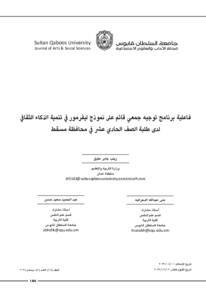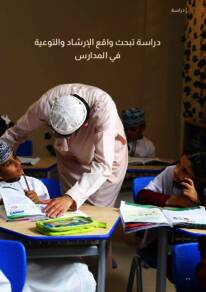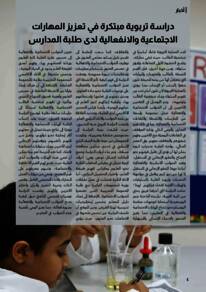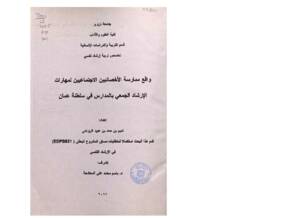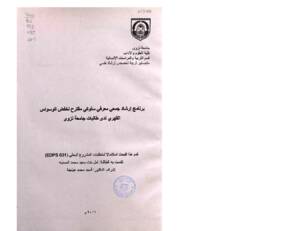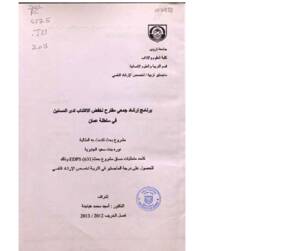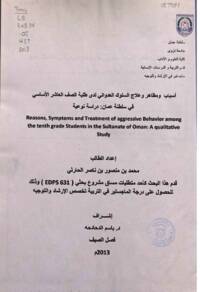Document
فاعلية برنامج توجيه جمعي قائم على نموذج ليفرمور في تنمية الذكاء الثقافي لدى طلبة الصف الحادي عشر في محافظة مسقط.
Source
مجلة الآداب والعلوم الاجتماعية. مج. 15. ع. 3. ص. 157-172.
Contributors
البحرانية، منى بنت عبدالله. , Author
حسن، عبد الحميد سعيد., Author
Other titles
The effectiveness of a collective counseling program based on livermore's model in developing cultural intelligence among eleventh-grade students in muscat governorate.
Country
عمان.
City
مسقط
Publisher
كلية الآداب والعلوم الاجتماعية، جامعة السلطان قابوس.
Gregorian
2024-12-01
Language
Arabic
English abstract
The aim of this study was to investigate the effectiveness of a Livermore-based career guidance program in
developing cultural intelligence among students of grade 11 in Muscat Governorate. The study sample included
96 students who acquired scores below the average in the pretest. Students were divided into two groups:
Experimental group that consisted of 48 student and control group that contained 48 students. The experimental
group underwent a career guidance program. Cultural intelligence scale was applied, which included 20
statements distributed in four dimensions: metacognition, cognitive, motivational, and behavioral. The program
consisted of 12 sessions to develop cultural intelligence among students. The results showed that there were
statistically significant differences between the mean score of the experimental and the control group, and the
differences in favor of the experimental group on all dimensions of the cultural intelligence scale. The results
illustrated that there were statistically significant differences between the mean score of the pre and posttest
of the experimental group indicating the differences in favor of the posttest. Results also showed statistical
significance between experimental group response and gender which was in favor of the female students.
ISSN
Online: 2522-2279
Print: 2312-1270
Arabic abstract
هدفت الدراسة إلى استقصاء فاعلية برنامج توجيه جمعي قائم على نموذج ليفرمور في تنمية الذكاء الثقافي لدى عينة من الصف الحادي عشر في محافظة مسقط. وشملت العينة 96 طالبًا وطالبة من الذين حصلوا على درجات أقل من المتوسط في التطبيق القبلي لقياس الذكاء الثقافي، حيث تم توزيعهم في مجموعتين: تجريبية وضابطة. تكونت المجموعة التجريبية من 48 طالبًا وطالبة، وخضعت لبرنامج توجيه جمعي، بينما اشتملت المجموعة الضابطة على 48 طالبًا وطالبة، ولم تخضع المجموعة التجريبية لأي برنامج توجيهي جمعي. اعتمدت الدراسة على المنهج شبه التجريبي، واستخدم مقياس الذكاء الثقافي، واشتمل المقياس على 20 عبارة موزعة على أربعة أبعاد وهي: ما وراء المعرفة، المعرفي، التحفيزي، والسلوكي. ولقد اشتمل البرنامج على 12 جلسة لتنمية الذكاء الثقافي لدى الطلبة. أظهرت النتائج وجود فروق ذات دلالة إحصائية بين متوسطات المجموعة التجريبية والمجموعة الضابطة، وأن الفروق لصالح المجموعة التجريبية على جميع أبعاد مقياس الذكاء الثقافي. بالإضافة إلى وجود فروق ذات دلالة إحصائية في الاختبار البعدي للمجموعة التجريبية لصالح الاختبار البعدي، وكذلك وجود فروق ذات دلالة إحصائية في استجابات المجموعة التجريبية والنوع الاجتماعي، حيث أظهرت تفاعل الإناث في المجموعة التجريبية أعلى من الذكور.
Category
Journal articles

